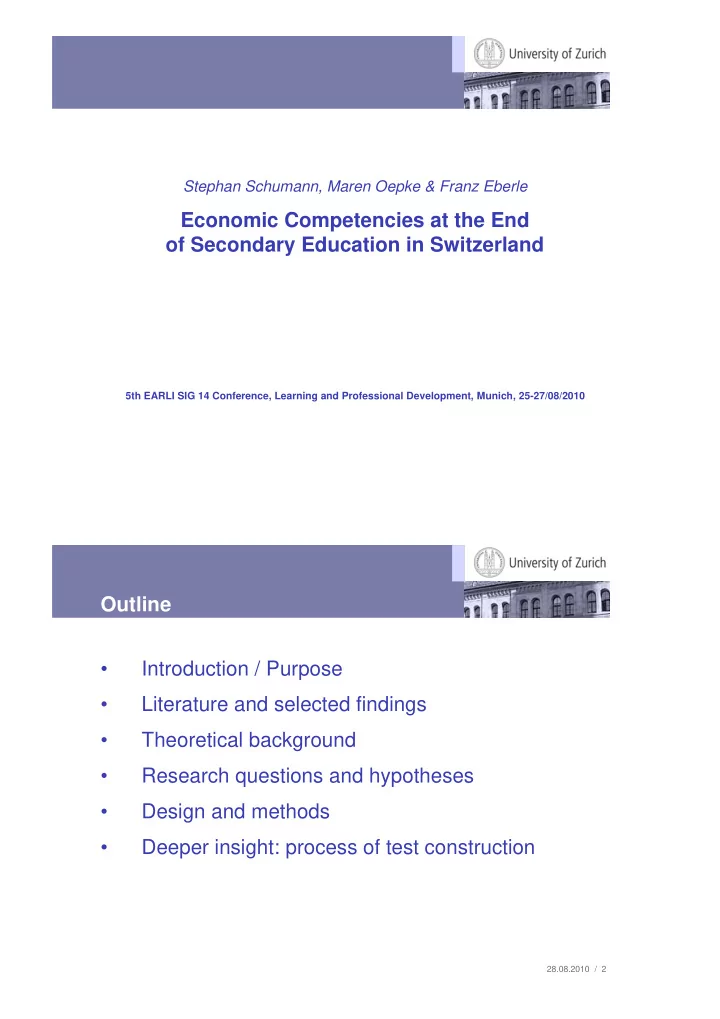

Stephan Schumann, Maren Oepke & Franz Eberle Economic Competencies at the End of Secondary Education in Switzerland 5th EARLI SIG 14 Conference, Learning and Professional Development, Munich, 25-27/08/2010 Outline • Introduction / Purpose • Literature and selected findings • Theoretical background • Research questions and hypotheses • Design and methods • Deeper insight: process of test construction Fusszeile 28.08.2010 / 2
Introduction / Purpose Why are economic competencies necessary? Education Private life Training Economic s e s Workplace s e c o r p Social Participation “Economic understanding is, more than anything else, the ability to use a set of principles to better understand how the world around us works“ (US-Economics Framework, 2006) Fusszeile 28.08.2010 / 3 Introduction / Purpose • Empirical deficit for a lot of countries, for Switzerland too • Our study: assessment of students` economic competencies in Grammar Schools (GS) and Professional Maturity Schools (PMS; vocational + general education) • grade 12 and 13 • Economic Education (contents: Economics, Business Administration, Law): GS: basic or advanced courses, PMS: compulsory courses (amount dependent on PMS- direction) • German-speaking part of Switzerland Fusszeile 28.08.2010 / 4
Introduction / Purpose Employment University of Applied Sciences University 3% 8% 80% 55% Professional Maturity School Apprentice- Grammar school ship In combination with an apprenticeship PMS1: integrated, PMS2: consecutive Grammar Lower Secondary Eduction school (up to grade 9) (longterm) Primary Education (grade 1 - 6) Swiss Educational System (simplified illustration) Fusszeile 28.08.2010 / 5 Introduction / Purpose 60% German Rumantsch French Italian Swiss Language Regions Fusszeile 28.08.2010 / 6
Literature and selected findings • USA: largest body of studies on economic competencies and the effects of economic education • Milestone: “Economic Education in Schools“- Report (Committee for Economic Development, 1961) • Development of the “Test of Economic Under- standing (TEU)” (National Council of Economic Education, 1964) • several Studies using the TEU identified a substantial lack of economic knowledge among students Fusszeile 28.08.2010 / 7 Literature and selected findings • 1970s - 1990s: „Framework for Teaching Basic Economic Concepts“ (Hansen et al., 1977; Saunders et al., 1984; Saunders & Gilliard, 1995) • Based on the framework: Development of three editions of the “Test of Economic Literacy (TEL)” (Soper, 1979, 2nd edition by Soper & Walstad, 1987; 3rd edition by Walstad & Rebeck, 2001) • TEL: most frequently used instrument for assessing economic competencies on High School level • International studies have used the TEL: the results show considerable national differences (Walstad, 1994): Students from Australia, the UK and South Korea performed better, whereas the mean scores for the US, Germany, Austria, Switzerland and Greece in particular were lower Fusszeile 28.08.2010 / 8
Literature and selected findings Limitations of the TEL: 1. Content: economics only, topics of business administration and financial accounting were not considered 2. based on the national US framework (TEL3: “National Content Standards in Economics”) 3. TEL-using studies are often focused on achievement only, data of individual attitudes, values and interest on economic problems were assessed fewer Fusszeile 28.08.2010 / 9 Theoretical background Definition of economic competencies • ability to successfully tackle „authentic, everyday- life“ demands related to economic problems • broad understanding: � core dimension of economic competencies: economic knowledge and skills (economic literacy) � interest in economic problems and motivational-volitional orientations � attitudes and values for responsible problem-solving Fusszeile 28.08.2010 / 10
Theoretical background School context General social conditions Teaching and learning components of economic lessons Outcome Student prerequisites Economic Competencies Variables outside of school (family, peers, media etc.) Framework for the development of students` economic competencies inside and outside of school Fusszeile 28.08.2010 / 11 Research questions and hypotheses Leading research questions: 1. What is the level and distribution of the different components of economic competencies and in what way are these components interrelated? 2. Which individual and contextual variables are intercorrelated with the economic competencies and how big are the effects? Fusszeile 28.08.2010 / 12
Research questions and hypotheses Selected questions and hypotheses (with respect to the component “knowledge and skills“): � Is there a difference between student`s from grammar schools vs. PMS? � School type: GS: Students in advanced courses outperform learners in basic courses, PMS: Students in PMS-Type „Business & Administration“ score higher than students in the other types � There are moderate differences between classes � We assume positive correlations with: • math achievement, reading comprehension and basic cognitive competence (medium-sized effects) • socio-economic background (small effect) • teaching/instructional variables (small effects) • Age (small effect) � Gender: male students score higher (small effect) � ... Fusszeile 28.08.2010 / 13 Design and methods • Cross-sectional design (main study: second quarter 2011, pilot study fourth quarter 2010) • Instruments: achievement tests (IRT) and student questionnaires • representative sample of students from grammar schools and professional maturity schools in the German-speaking part of Switzerland (N ~ 3.000, one-stage stratified cluster sample, units are intact classes; subsequent weighting) • external test administration Fusszeile 28.08.2010 / 14
Test construction Test of economic knowledge and skills Identification of relevant contents: 1. content: economics, business administration and financial accounting = need for a thematic, categorical system and a well-founded identification and distribution of the themes and sub-themes 2. capturing of the construct “economic literacy” (ability to successfully tackle real-world situated demands related to economic problems) Fusszeile 28.08.2010 / 15 Test construction Claim 2: Identification of economic Claim 1: Construction of a terms and concepts related to thematical system real-world situations Analysis and classification of university lecture papers (first academic year) Categorical system Fusszeile 28.08.2010 / 16
Recommend
More recommend